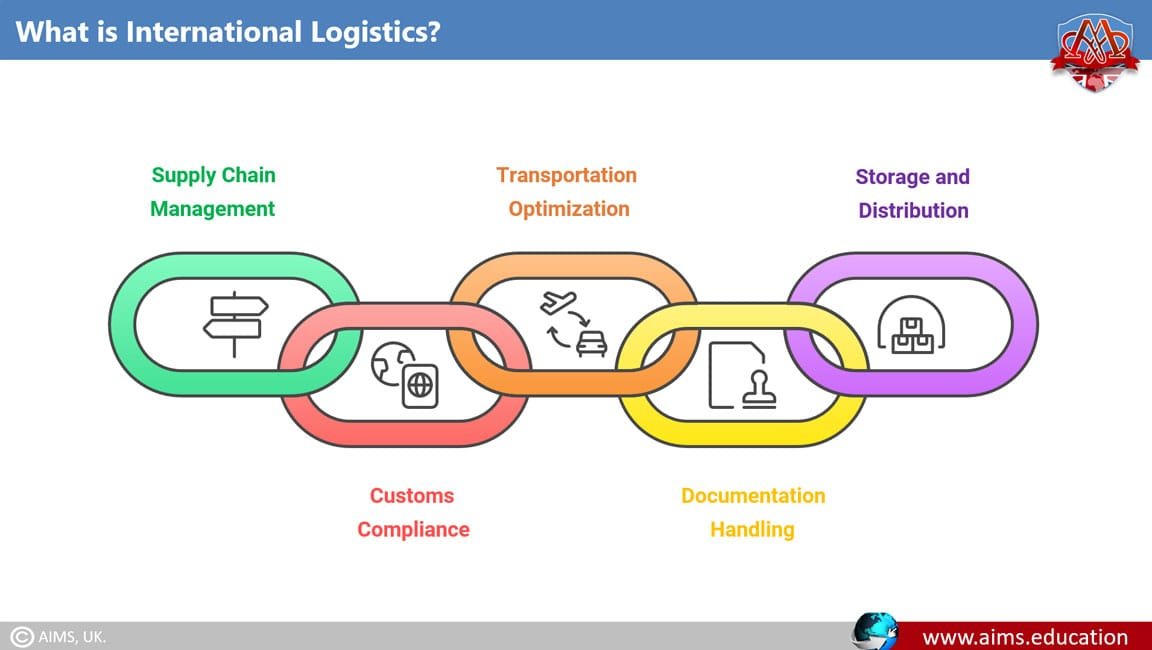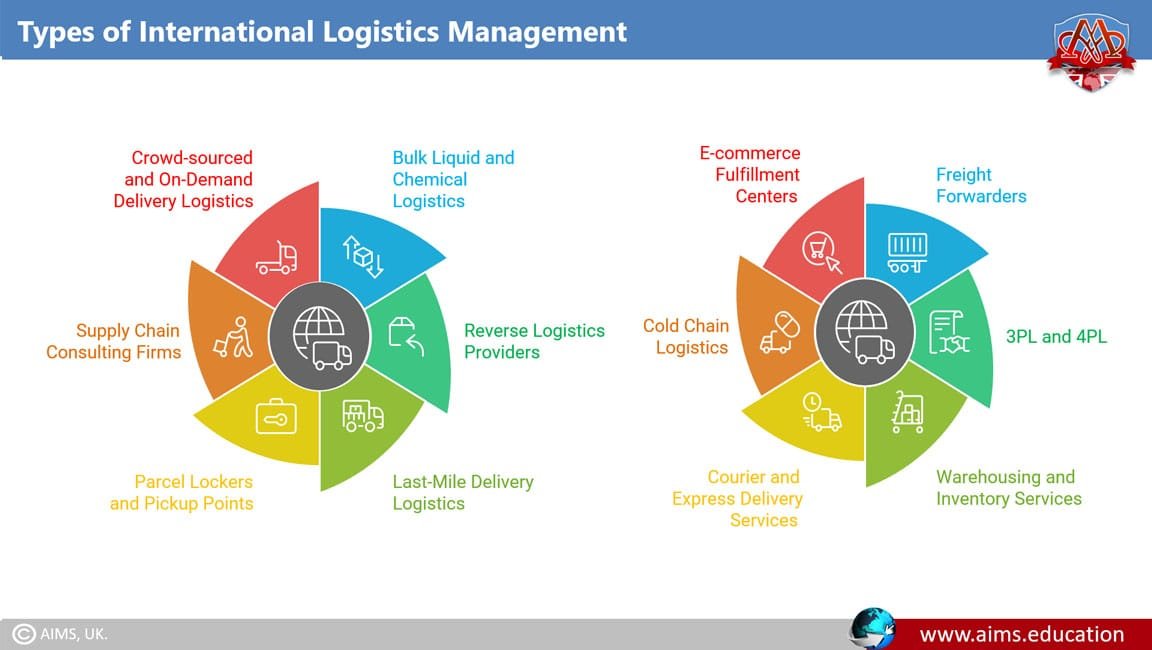What is an International Logistics Management?
International logistics management refers to strategizing, coordinating, and supervising all logistics operations necessary for ensuring the successful exchange of goods and services on a global scale. Its objectives are to guarantee a seamless supply chain management from the origin to the ultimate destination, considering factors such as customs regulations, transportation, legal requirements, and warehousing. International logistics management encompasses tasks like route planning and transport mode optimization, the handling of import and export documentation, and the administration of customs formalities.
Additionally, international logistics management also focuses on storing and distributing goods and tracking shipments alongside adept supply chain strategies to manage suppliers and logistics partners across various nations.
3 Major Objectives of International Logistics Management
The major objectives of international logistics involve establishing efficient and dependable supply chain operations that function seamlessly and predictably while simultaneously reducing costs and mitigating uncertainties. Furthermore, it can enhance supplier relationships with customers, partners, and potential clients. Let us examine the key objectives of international logistics management.
1. Cost Efficiency
International logistics management succeeds in logistics cost reduction by scrutinizing cost structures, considering alternatives such as real estate and regulatory environments, and adapting to evolving constraints.
2. Reliability
International logistics guarantee smooth and predictable operations by avoiding delays, errors, or disruptions arising from local regulations, policies, or logistical mistakes.
3. Relationships
It reinforces relationships between suppliers, customers, and stakeholders by ensuring efficient, timely, and reliable logistics, promoting trust, and gaining a competitive edge.
3 Key Features of International Logistics Management
International logistics possesses distinct characteristics that set it apart from other logistics frameworks. Notably, three key features can be emphasized:
1. Global Reach
International logistics inherently involves operations between two or more nations, reflecting its global or cross-border supply chain nature. This aspect introduces complexity due to the necessity of addressing customs regulations and international legal requirements.
2. Compliance with Standards
As a result of the aforementioned global reach, each cross-border supply chain must signify various international standards, which vary based on the countries involved and the nature of the goods being transported.
3. Diverse Transportation Methods
Each type of international logistics utilizes multiple modes of transport to facilitate the movement of goods across borders. Consequently, effective international logistics requires the integration of various land, air, and maritime transport options.

4 Critical Elements of International Logistics
An international logistics company must follow best practices across various operational components to ensure reliable and consistent execution while remaining adaptable to evolving circumstances. Competent international logistics managers will dedicate time to consider each of these elements and establish a solid foundation for them.
1. Transport Visibility
The ability to track goods in real-time from their point of origin to their final destination, allows businesses to monitor shipments, manage inventory effectively, respond to market demands, and evaluate performance metrics.
2. Chain of Custody
It increases visibility by documenting the individuals or entities handling the goods at each stage, which aids in identifying errors, preventing potential issues, and ensuring accountability, particularly when multiple carriers are involved in international logistics.
3. Traceability to Origin
It involves monitoring the source of goods and their components, which are essential for compliance, quality assurance, and effective supply chain management, often mandated for safety and regulatory reasons.
4. Integrity of Consignment
It guarantees that goods arrive at their designated recipient in the correct condition, fully intact, and properly managed by maintaining quality standards, such as appropriate storage for perishable items, fulfilling contractual obligations, and meeting recipient expectations.
Types of International Logistics
Selecting the appropriate logistics provider or a combination of providers is contingent upon the unique requirements and goals of the business. This includes considerations such as the nature of the goods, transportation needs, geographical reach, and the complexity of the supply chain.
1. Freight Forwarders
They act as intermediaries between shippers and carriers Freight forwarders facilitate the transportation of goods through various modes, including air, sea, road, or rail. They manage documentation, customs clearance, and other logistical responsibilities.
2. Third-Party Logistics (3PL) and Fourth-Party Logistics (4PL)
3PL and 4PL logistics providers deliver a comprehensive array of logistics services, encompassing transportation, warehousing, inventory management, order fulfillment, and supply chain optimization. They customize solutions to align with specific client requirements.
3. Warehousing and Inventory Services
They offer essential services such as storage, inventory management, order picking, packing, and distribution.
4. Courier and Express Delivery Services
They specialize in small parcel and express deliveries. They provide rapid, door-to-door delivery services for time-sensitive shipments.
5. Cold Chain Logistics
These providers offer smart logistics vehicles that focus on the transportation and storage of temperature-sensitive products, including perishable foods, pharmaceuticals, and vaccines.
6. E-commerce Fulfillment Centers
They are concentrating on order fulfillment and distribution for e-commerce enterprises. These providers ensure the efficient and accurate delivery of online orders.
7. Bulk Liquid and Chemical Logistics
These entities specialize in the transportation and management of bulk liquids and chemicals, ensuring compliance with rigorous safety and environmental regulations.
8. Reverse Logistics Providers
Reverse logistics providers oversee the processes related to the return, recycling, and disposal of products, assisting businesses in managing product recalls, returns, and recycling initiatives.
9. Last-Mile Delivery Logistics
They focused on the final segment delivery to the end consumer, these providers operate primarily in urban and densely populated regions, striving to achieve timely and efficient delivery.
10. Parcel Lockers and Pickup Points
These providers offer alternative delivery solutions, enabling customers to collect parcels at convenient locations, including lockers, retail outlets, or designated pickup points.
11. Supply Chain Consulting Firms
These consultants offer strategic insights, process enhancements, and technological solutions to assist supply chain businesses in refining their logistics and supply chain practices.
12. Crowd-sourced and On-Demand Delivery Logistics
These providers utilize crowdsourcing to deliver flexible and immediate delivery services.

3 Channels of International Logistics
International logistics includes three fundamental process flows often categorized into separate “channels” to allow companies to concentrate on each aspect individually. While the primary focus of logistics is the transportation of physical goods and materials across borders, it is essential to recognize that the movement of money and information is equally important. The following channels illustrate these three vital flows:
1. Movement of Goods (Distribution Channel)
Administer the transportation, storage, and delivery of physical goods across international borders.
2. Movement of Money (Transaction and Payment Channel)
Superintend payment methods, tax obligations, currency exchange, and reporting associated with international transactions.
3. Movement of Information (Documentation and Contact Channel)
Facilitates successful communication, documentation, and shared data to ensure regulatory compliance and smooth operations.
5 Main Challenges of International Logistics Management
International logistics managers encounter numerous challenges daily, and in recent years, the intensity of these challenges has escalated. Below are some of the most prevalent challenges faced in international logistics;
1. Geographic Navigation
Extended distances and various modes of transportation contribute to increased timelines, costs, and potential delays.
2. Workforce Requirements
The need for skilled personnel in transportation, loading, and technology management is essential for maintaining efficient operations.
3. Communication Barriers
Alignment of language, currency, data systems, and industry-specific terminology is crucial across various regions.
4. Regulatory Compliance
Diverse legal frameworks, permits, taxation, and compliance issues necessitate expert oversight.
5. Political Instability
Unforeseen changes such as visa regulations, security measures, labor strikes, or geopolitical tensions can disrupt supply chains.

5 Key Practices for Outstanding International Logistics Management
One of the significant challenges in international logistics is maintaining reliable and efficient operations. By adopting best practices in its supply chain operations and collaborations with partners, a business can mitigate some of the prevalent and expensive sources of inefficiencies. Some of these practices are:
1. Standardization
Optimize processes, documentation, and protocols to minimize confusion, conserve time, and ensure uniformity across operations.
2. Enhance Visibility
Improve tracking capabilities to obtain real-time data, allow identification of inefficiencies, and enhance predictability throughout the supply chain.
3. Controls
Establish formal accountability, perform audits, and ensure operations remain within defined parameters while promoting a supportive environment.
4. Communication
Eliminate barriers, prompt discussions to enhance coordination, and facilitate problem-solving.
5. Strong Partnerships
Encourage trust with dependable partners who comprehend your business, share valuable insights, and collaborate for shared growth.
5 Benefits of International Logistics Management
Worldwide international logistics serves as an invaluable asset, engaging with specialized suppliers in this domain offers a range of competitive advantages. Supply chain graduates study international logistics management in detail during the logistics management and supply chain diploma and MBA degree in supply and logistics management to develop skills, so the students can smoothly manage international logistics-specific processes. Let us review the key benefits of international logistics management:
1. Expanded Market Opportunities
It provides facilitation of cross-border transport to new markets. This opportunity for growth provides various benefits, including risk diversification and an increase in potential customers and partners.
2. Enhanced International Reputation
The effectiveness of logistics, whether domestically or globally, is closely tied to customer satisfaction. A well-organized export service acts as an excellent foreword for any business.
3. Increased Production Output
By ramping up production, we can improve our profit margins. Additionally, this increase opens up more favorable negotiation opportunities with partners and suppliers.
4. Promotion of Competitive Pricing Strategies
The internationalization of logistics is essential for reducing production and distribution costs, enabling us to conduct operations in more economically advantageous countries.
5. Improved Environmental Sustainability
The strategies and processes associated with international logistics significantly impact the environment. A prime example is the optimization of the supply chain to minimize CO2 emissions.
Frequently Asked Questions
Q1: What is international logistics management?
It refers to planning, coordinating, and controlling the flow of goods and information across borders to ensure efficient global supply chain operations while meeting legal and customs requirements.
Q2: What are the main objectives of international logistics?
They include achieving cost efficiency, operational reliability, and building strong relationships among suppliers, customers, and logistics partners.
Q3: What are the key features of international logistics?
Global reach, adherence to international standards, and integration of various transportation modes such as sea, air, and land.
Q4: What are the critical elements of international logistics management?
Transport visibility, chain of custody, traceability to origin, and maintaining consignment integrity for accountability and quality control.
Q5: What types of providers operate in international logistics?
Freight forwarders, 3PL/4PL firms, warehousing and inventory managers, courier services, cold chain logistics, and e-commerce fulfillment centers.
Q6: What are the three main channels of international logistics?
Movement of goods, movement of money, and movement of information — ensuring complete coordination across trade operations.
Q7: What challenges do companies face in international logistics?
Geographic distances, workforce gaps, communication barriers, compliance requirements, and political risks.
Q8: What best practices enhance international logistics performance?
Standardizing processes, improving visibility, enforcing controls, fostering communication, and developing trusted partnerships.
Q9: What are the benefits of international logistics management?
Expanded markets, improved reputation, increased output, competitive pricing, and better sustainability through optimized operations.
Q10: Why is international logistics important for supply chain graduates?
It provides practical expertise in global logistics and supply chain coordination — essential for managing international trade successfully.
